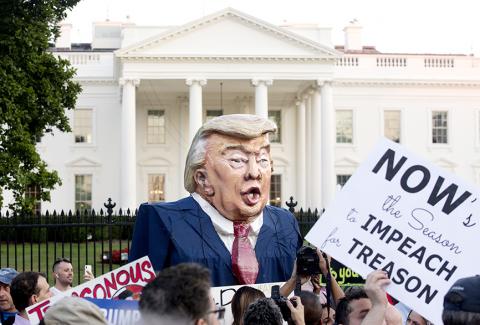US President Donald Trump on Wednesday spent a second day managing the political fallout from his widely criticized meeting with Russian President Vladimir Putin, shifting stances and mopping up what the White House said were misstatements.
His toughness with the longtime US foe in question, Trump said that he told Putin face-to-face during Monday’s summit to stay out of US elections “and that’s the way it’s going to be,” marking a turnaround from Trump’s first description of his meeting with Putin.
Still, Trump backtracked on whether Russia is targeting US elections.

Photo: EPA
When asked the question on Wednesday, he answered “no,” a reply that put him sharply at odds with public warnings from his own intelligence chief.
Hours later, the White House stepped in to say that Trump’s answer was not what it appeared.
The zigzagging laid bare the White House’s search for a path out of trouble that has dogged the administration’s discussions of Russia from the start, but spiraled after Trump’s trip to Helsinki.
After days of criticism from Democrats and Republicans, Trump has appeared more sensitive than usual to outside opprobrium.
The scale of the bipartisan outcry at Trump’s stance toward Putin has only been rivaled by his waffling last year over condemning white supremacist demonstrators in Charlottesville, Virginia.
“I let him know we can’t have this,” Trump told CBS News of his conversations with Putin. “We’re not going to have it, and that’s the way it’s going to be.”
Asked if he would he hold Putin personally responsible for further election interference, he replied: “I would, because he’s in charge of the country.”
Trump on Wednesday was asked during a Cabinet meeting if Russia was still targeting the US, to which he answered “no” without elaborating.
That came just days after US Director of National Intelligence Dan Coats compared the cyberthreat today to the way that US officials before 9/11 said that intelligence channels were “blinking red” with warning signs that a terror attack was imminent.
White House press secretary Sarah Huckabee Sanders later on Wednesday said that Trump was actually saying “no” to answering additional questions — even though he went on to address Russia.
“The president is wrong,” US Senator Susan Collins said of Trump’s one-word response.
Told that Sanders had since clarified, she responded: “There’s a walk-back of the walk-back of the walk-back of the walk-back? This is dizzying.”
Pressed on why Trump has repeatedly passed on opportunities to publicly condemn Putin’s actions, Sanders said that Trump was working to make the most of an “opportunity” for the two leaders to work together on shared interests.
One such opportunity is what Trump called an “incredible offer” from Putin to allow the US access to Russians accused of election hacking and other interference. In exchange, Putin wants Russian interviews of Americans accused by the Kremlin of unspecified crimes.
Sanders said that Trump was still weighing the offer with his team, adding: “We’ve committed to nothing.”

The Central Election Commission has amended election and recall regulations to require elected office candidates to provide proof that they have no Chinese citizenship, a Cabinet report said. The commission on Oct. 29 last year revised the Measures for the Permission of Family-based Residence, Long-term Residence and Settlement of People from the Mainland Area in the Taiwan Area (大陸地區人民在台灣地區依親居留長期居留或定居許可辦法), the Executive Yuan said in a report it submitted to the legislature for review. The revision requires Chinese citizens applying for permanent residency to submit notarial documents showing that they have lost their Chinese household record and have renounced — or have never

A magnitude 5.6 earthquake struck off the coast of Yilan County at 12:37pm today, with clear shaking felt across much of northern Taiwan. There were no immediate reports of damage. The epicenter of the quake was 16.9km east-southeast of Yilan County Hall offshore at a depth of 66.8km, Central Weather Administration (CWA) data showed. The maximum intensity registered at a 4 in Yilan County’s Nanao Township (南澳) on Taiwan’s seven-tier scale. Other parts of Yilan, as well as certain areas of Hualien County, Taipei, New Taipei City, Taoyuan, Hsinchu County, Taichung and Miaoli County, recorded intensities of 3. Residents of Yilan County and Taipei received

Taiwan has secured another breakthrough in fruit exports, with jujubes, dragon fruit and lychees approved for shipment to the EU, the Ministry of Agriculture said yesterday. The Animal and Plant Health Inspection Agency on Thursday received formal notification of the approval from the EU, the ministry said, adding that the decision was expected to expand Taiwanese fruit producers’ access to high-end European markets. Taiwan exported 126 tonnes of lychees last year, valued at US$1.48 million, with Japan accounting for 102 tonnes. Other export destinations included New Zealand, Hong Kong, the US and Australia, ministry data showed. Jujube exports totaled 103 tonnes, valued at

BIG SPENDERS: Foreign investors bought the most Taiwan equities since 2005, signaling confidence that an AI boom would continue to benefit chipmakers Taiwan Semiconductor Manufacturing Co’s (TSMC, 台積電) market capitalization swelled to US$2 trillion for the first time following a 4.25 percent rally in its American depositary receipts (ADR) overnight, putting the world’s biggest contract chipmaker sixth on the list of the world’s biggest companies by market capitalization, just behind Amazon.com Inc. The site CompaniesMarketcap.com ranked TSMC ahead of Saudi Aramco and Meta Platforms Inc. The Taiwanese company’s ADRs on Tuesday surged to US$385.75 on the New York Stock Exchange, as strong demand for artificial intelligence (AI) applications led to chip supply constraints and boost revenue growth to record-breaking levels. Each TSMC ADR represents